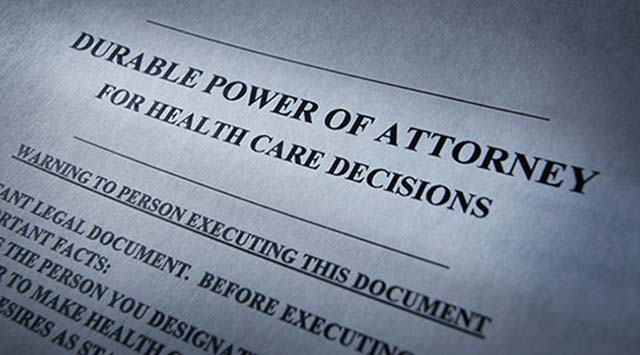Medical Power of Attorney
Unexpected end-of-life situations can happen at any age. By planning ahead, you can receive the medical care you want, relieve the burden caregivers face when making decisions during moments of crisis or grief, and reduce the confusion or disagreement about the choices you would want people to make on your behalf.

There are two basic documents that allow you to communicate your wishes for medical care: a living will and a medical power of attorney (also called a health care power of attorney). In some states, both documents are combined into a single form – often called an advanced directive.
A living will spells out your preferences about certain kinds of life-sustaining treatments. For example, you can indicate whether you do or do not want interventions such as cardiac resuscitation, tube feeding, and mechanical respiration.
A power of attorney is an agreement that gives the person you choose the legal authority to speak for you and make medical decisions for you if you are ever unable to speak and make medical decisions for yourself. The person you choose may be a spouse, other family member, friend, or member of a faith community. You may also choose one or more alternates in case the person you chose is unable to fulfill his or her role.
Who Needs to Appoint a Medical Power of Attorney?
A medical power attorney may be created for current health reasons or out of love. If you are legally married, your spouse will make medical decisions on your behalf unless you choose someone else through a medical power of attorney document. If you are a parent to minor children or a legal guardian for someone, you will make medical decisions on their behalf. In all other situations, you should choose someone to be your medical power of attorney.
You can obtain your state’s version of the form from your doctor, a local hospital, a nursing home, or online from your state government website. Many states have combined the medical power of attorney form and living will form into one document called advanced directives.
Choosing a Medical Power of Attorney
If you decide to appoint a medical power of attorney, consider:
- Someone who is willing and able to discuss medical and end-of-life options with you.
- Someone who is not intimidated by medical professionals and is willing to ask challenging questions.
- Someone who can put aside his or her own feelings about a particular procedure or medical option in order to ensure that your wishes are carried out.
- Someone who understands and can be trusted to make decisions that adhere to your wishes about medical options and end-of-life care.
Also, you may want to consider choosing one or more alternates in the event that your first choice is unable to carry out the responsibility.
Making it Legal – Medical Power of Attorney Forms
A medical power of attorney becomes valid after it has been agreed upon by both parties and signed in front of a notary. Requirements vary by state, so be sure to complete your state-specific form and take careful note of your state’s requirements.
Once you have completed your form, you should ensure that everyone involved in your care has a copy and is aware of it:
- Keep the originals in a safe but easily accessible place.
- Give a copy to your doctor.
- Give a copy to your medical power of attorney and any alternates.
- Keep a record of who has your advance directives.
- Talk to family members and other important people in your life about your advance directives and your health care wishes.
- Carry a wallet-sized card that indicates you have advance directives, identifies your health care agent, and states where a copy of your directives can be found.
- Keep a copy with you when you are traveling.
When Does a Medical Power of Attorney Take Effect?
Your medical power of attorney takes effect if your doctor determines that you lack the ability to make your own health care decisions. This is often called ‘capacity.’ It means that:
- you can’t understand the nature and consequences of the health care choices that are available to you, and
- you are unable to communicate your own wishes for care, either orally, in writing, or through gestures.
When Does a Medical Power of Attorney End?
Your written medical power of attorney remains in effect as long as you are alive, unless you specifically revoke your documents or a court steps in. You can change your directives at any time. Just be sure that your health care providers and your caregiver(s) know your intentions. To make changes, you need to complete a new form, distribute new copies, and destroy all old copies. Specific requirements for changing directives may vary by state.
Back to Planning Center
More Health Care Decisions Resources
Related Posts

Family Dynamics: Navigating End-of-Life Planning with Loved Ones
Talking about end-of-life planning with family can be tough. Different opinions, emotions, and family dynamics often come into play, sometimes leading to misunderstandings or even conflicts. In this post, we’ll explore how family dynamics can influence the planning process and share some practical tips for making it a little smoother.

Essential Legal Documents for End-of-Life Planning (Without the Legal Jargon)
If you’re like most, talking about end-of-life planning might not be the most exciting topic, but it’s one of the most important things you can do for yourself and your loved ones. And it’s not just about having conversations—it’s about making sure your wishes are legally documented so they can actually be followed.

Proactivity Over Procrastination: Take Control of Your End-of-Life Planning!
Let’s be real—procrastination happens to all of us, especially when it comes to topics like end-of-life planning. It’s not exactly something you’re eager to dive into over your morning coffee. But here’s the deal: putting in a little effort now can save your loved ones a world of stress and confusion later on.

Talk Isn’t Cheap: The Importance of End-of-Life Conversations
Discussing end-of-life wishes can feel daunting and, at times, uncomfortable. However, these conversations can hold profound value, offering clarity and a sense of peace for everyone involved. Openly sharing end-of-life preferences ensures that loved ones are on the same page, helping to prevent misunderstandings or potential conflicts during challenging times.